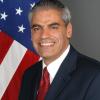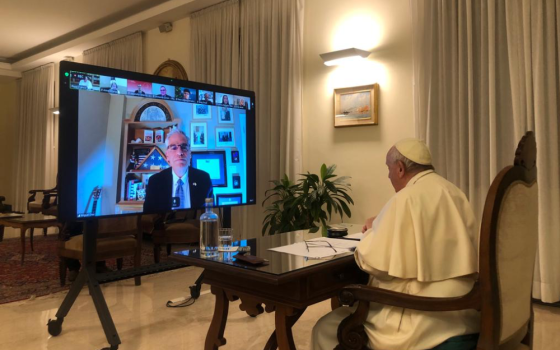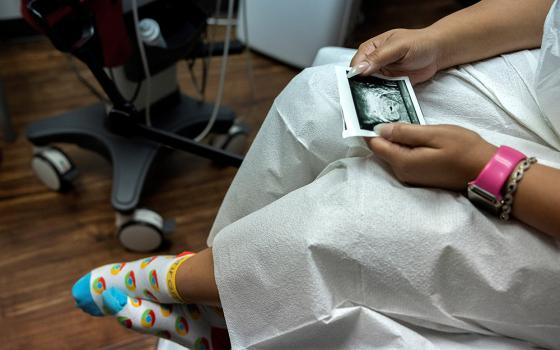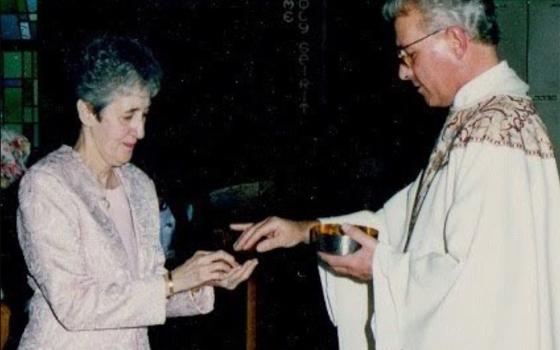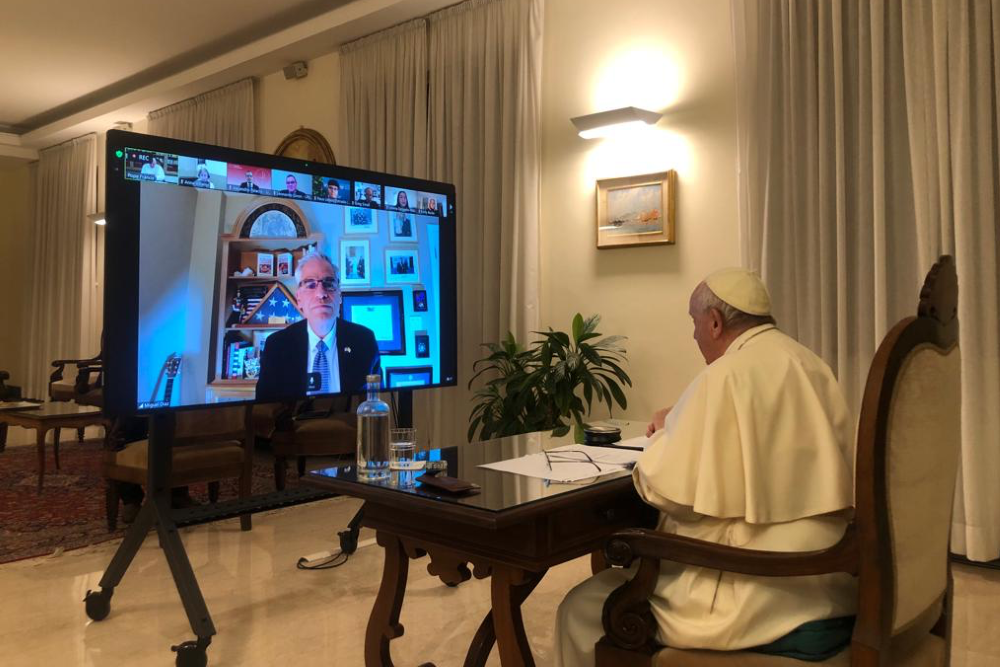
Pope Francis meets with students from North, Central and South America, as well as the Caribbean, during a Feb. 24 virtual dialogue as part of the Synod of Bishops on synodality. (Vatican Media)
The historic Feb. 24 encounter between Pope Francis and college students from across the Americas was part of a larger continental experience of synodality that involved 58 universities in 21 countries. For two months university students across seven regions in the Americas gathered virtually in a synodal process exploring the root causes of migration and dreaming together just resolutions.
The initiative was born from a collaboration between Argentinian theologian Emilce Cuda and Loyola University Chicago, my home institution. Cuda, the first female secretary of the Pontifical Commission for Latin America, or PCAL, was instrumental in orchestrating the pope's participation.
The powerful public meeting between Francis and university students was mutually rewarding. Afrikaan Sahra, a refugee from Somalia, described the process as life changing. He observed how the pope "was tenderhearted and very open-minded to differences." A number of students were touched by the fact that the pope listened to them, took notes during the Zoom meeting, and commented on their ideas and proposals to tackle the root causes of migration. Cuda commented that Francis "is still caught up in joy, delighting in the moment that he shared with them."
Many have now begun to ask what comes next. These students want more than business as usual in the church. They want conversation to evolve into concrete actions, and they want marginalized people to be recognized as agents of change. As these students dream of a new beginning in the church, they are ready to take the lead in this innovative educational and synodal initiative to address the salient signs of the times within and beyond our American continent.
'The synod is meant for the entire Church and not just for theologians or clerics.'
— Emilce Cuda
Throughout our conversations, student participants consistently saw themselves as indispensable agents of change willing to exercise their intellectual abilities in solidarity with those most in need. Their reflections were articulated in what Francis calls "the language of the mind, the language of the heart and the language of the hands." They resonated with the pope's observations that, "Education in general, but university education in particular, is not only about filling the head with concepts." For these change agents their education is about making a difference. Their research is about seeking concrete solutions to real-life challenges. Their solidarity across borders and with those who are marginalized is about what participant Lorena Delgado-Márquez of Denver called "collaborative justice."
Cuda wholeheartedly concurs with students' dreams to pave a better future. During our conversations debriefing the entire experience, from regional meetings through the students' encounter with the pope, she observed, "These students must be so pleased that they have become protagonists in several ways: First and foremost, Pope Francis welcomed them as protagonists of the synodal process itself, for the synod is meant for the entire Church and not just for theologians or clerics." She hoped that they are now catalysts for a process that will engage students from other parts of the world and other universities en nuestra América.
Welcoming new minds, hearts and hands lies at the heart of a synodal church. As Pope Francis mentioned in his conversation with the students, this means that the church, as people of God, must be willing "to open its doors and exit from its temples to meet Jesus in the streets."
To become this synodal presence in the world is to embrace the mind, the heart and the hands of Jesus and seek to encounter and serve him preferentially among the poor and marginalized. The students who participated in this synodal process expressed deep commitments to become this synodal presence in the world, especially by placing themselves, their studies and their talents in service to re-incorporating those that have been disenfranchised from church and society, marginalized and oppressed by ecclesial and socioeconomic realities.
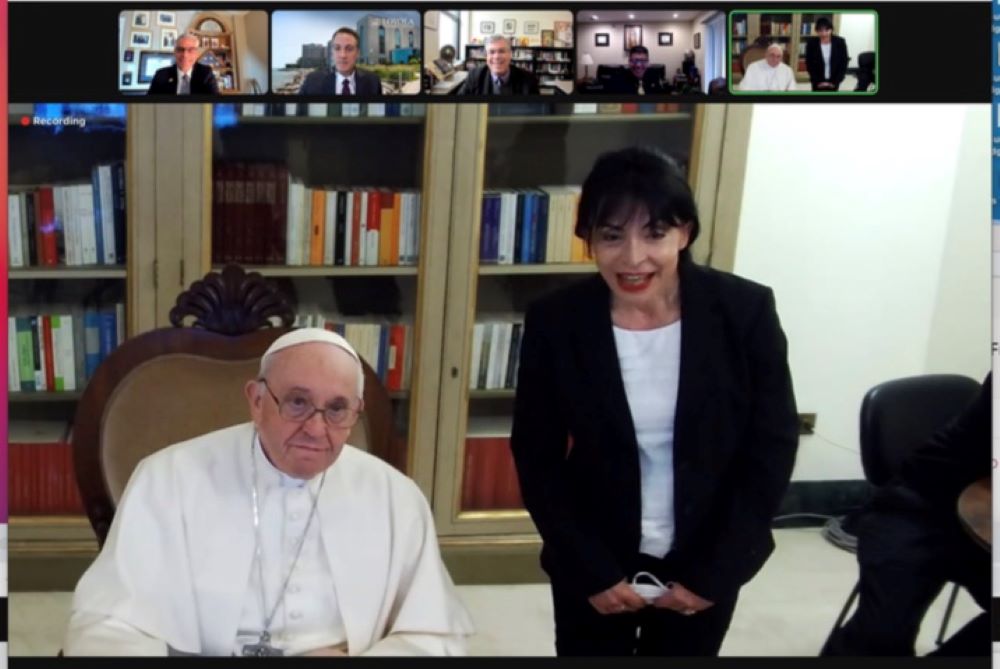
Emilce Cuda, the first woman secretary of the Pontifical Commission for Latin America, helped arrange the virtual dialogue between university students and Pope Francis. (Vatican Media)
Francisco Estrada Ortíz, a representative from El Salvador, explained, “My dream is that our group of students becomes a catalyst that enables us to work toward a more just society with greater solidarity, so that our siblings who live in the social peripheries can be incorporated without the need to leave their places of origin.”
On a personal note, as one of the educators involved in organizing this synodal process and in accompanying students through their thoughtful deliberations on the complexity of migrations, I, too, was moved by their dreaming and exhilarated by our papal encounter and dialogue.
As a Cuban exile, I resonated with the migration stories told by many of the students, shared in their pain of leaving one’s homeland, experienced similar feelings of cultural displacement and estrangement. As a former ambassador to the Holy See, I found hope in a new generation who prioritized the need to cross borders and engage in bridge-building conversations, a priority of my own time in diplomatic service.
Advertisement
Like Leonardo Girón from Honduras I, too, see in this bridge-building initiative an opportunity to animate many young persons throughout our continent to “support their neighbors, offer hope, and manifest love in concrete ways.”
Tragically, the conversation between Pope Francis and the students from the Americas took place the day after Russia's invasion of Ukraine, which also set in motion the largest displacement of people within Europe since World War II. This latest wave of violence unleashes unnecessary loss of life, fears of nuclear destruction, global insecurity and threats to our common home, underscoring yet again our broken world's desperate need to build bridges through nonviolent actions.
As Alejandro Palacio Puerta from Costa Rica confirmed, the time has come for "a new hour for the church, when we can become conscious of the need to walk together regardless of where we live in this continent or what language we speak, placing our resources, education, abilities and human efforts as the basis to build a new culture where all can partake of basic human needs and live a dignified life."
Whatever comes next needs to recognize the agency of the young in ways that make them active in planning and organizing those immediate and future steps, that acknowledges them as partners in identifying the pressing themes that need addressing, that respects their wisdom in determining the actions to resolve concerns — globally, regionally, locally.
Going forward, a Vatican commitment to develop and build bridges will work best when students are welcomed and fully invested in further synodal encounters, dialogues and actions. The momentum and enthusiasm generated through this hemispheric synodal process cannot be wasted, cannot devolve into what Pope Francis calls "useless and unproductive discussions." According to Jesús (Paco) Estrada, an aspiring immigration attorney from Los Angeles, this dreaming together is a promising move, an "essential dialogue to form the world that we want to live in."
